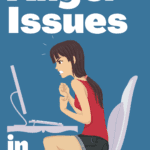Teenagers face a lot of challenges, and sometimes it’s hard to tell them apart from normal behavior or a hint of something more serious. Learn top signs of anger issues in teenagers and children that could signal bigger problems.
There are healthy ways to deal with strong emotions and angry feelings, and then there are not-so-healthy ways.
Sometimes children, teens, and young adults don’t have the right tools to deal with intense emotions. In fact, the human brain is still developing until we reach our mid-to-late 20’s.
On top of that, teenagers and kids of all ages face a lot of challenges, and sometimes it’s hard to tell them apart from normal behavior or a hint of something more serious.
As parents, there are different ways to help teenage girls and boys express anger properly and calm down to reduce emotional outbursts and relieve anxiety.
But first, it’s important to learn top signs of anger issues in teenagers that could signal bigger problems.

5 Signs of Anger Issues in a Teenager or Child
Dealing with anger issues in teens can be challenging, as it’s difficult to tell if a teenager’s outbursts are normal or an indication of something more serious.
If your teenager exhibits any of these signs—from aggressive behavior and outbursts to withdrawing from activities and social circles—it is important to seek help.
1) Unusually Intense Reactions
Teenagers with anger issues may react unusually intensely to situations. For example, they may become disproportionately angry or aggressive in response to everyday scenarios that would be expected to invoke mild annoyance or frustration.
They may also respond to perceived slights with intense hostility and seek revenge on those who wronged them in what they deem an appropriate manner.
Also read: 5 Cell Phone Rules for Teens
2) Outbursts of Rage
One of the most clear signs of anger issues in teenagers is outbursts of intense rage. These rages may involve screaming, insults and/or physical violence, and can be directed at anyone, including authority figures or family members.
Teenagers dealing with anger issues may also have difficulty controlling their behavior during an outburst, leaving them feeling ashamed and embarrassed after it subsides.
Read: Anger management skills and Emotional Coping Skills

3) Physically Abusive Behavior Toward People or Property
Teenagers exhibiting signs of anger issues may display physically abusive behavior toward people or property. This kind of behavior is a clear sign that the teenager is having difficulties managing their anger. Physical abuse includes hitting, punching, kicking, and/or breaking objects in frustration.
If you witness this kind of behavior, it’s important to intervene and get help for the teenager before it continues to escalate.
Learn more about Temper Tantrums and the Role of the Prefrontal Cortex
4) Difficulty appearing comfortable
Another sign of anger issues in teenagers is difficulty appearing comfortably with others.
If a teenager is having trouble relating to peers and adults, or forming relationships, the underlying cause may be unresolved feelings of anger.
Teenagers exhibiting this sign are likely trying to avoid forming connections with people or even avoiding certain situations altogether because they are unable to handle negative emotions properly. It’s important to find out the root cause of why your teen is struggling socially and whether their issue extends beyond unhappiness.
Also read: 5 Ways Battle Anxiety and Insecurity in Kids
5) Aggressively refusing to participate in activities
A key sign of anger issues in teenagers is an aggressive refusal to participate in activities or hobbies they used to enjoy.
If your teen is no longer interested in anything or has a sudden unwillingness to try new things, this could be indicative of unresolved anger.
It’s important to find out what is causing the behavior and why the teenager is struggling with participation in general. Talk to your teen about their feelings and any changes they have noticed before suggesting a more serious intervention if necessary.
These 3 activities are Great for Helping with mood swings and Teen Anxiety.

Angry Outbursts During the Teenage Years
If you think your teen’s anger could be a red flag for various mental health disorders it is important to seek professional help.
Educate yourself on symptoms of depression and other serious problems (such as bipolar disorder, oppositional defiant disorder, substance abuse).
Pay attention to signs of teen depression, anxiety disorder or other mental health issues commonly causing teenage anger in young people.
A clinical psychologist can help with violent behavior or other mental health problems that may arise during teen years. And remember, with mental health concerns, it’s always better safe than sorry.
Related: These calm down tips and deep breathing exercises are great for controlling the emotional response. And try this anger management workbook.
Final Thoughts on Top Signs of Anger Issues in Teenagers
Your teenager is busy learning their place in the world.
Naturally, this journey comes a long with insecurities, mistakes, and louds of feelings – Moody, defiant, and stressful feelings.
While it is normal for teens to feel angry, these 5 signs of anger issues in teenagers should not be ignored. Use these to identify if your teen needs some extra help navigating their ever-changing world.
For up-to-date discussions on raising strong kids, follow us on Facebook.
You may also find helpful: Top 10 Signs of a Spoiled Teen


Laurie
Wednesday 22nd of February 2023
Children who have reached adolescence, due to hormonal fluctuations, there will always be reverse phenomena. Many parents regard adolescents' adolescence as a nightmare period. When children feel the collision of parental control and self-consciousness, they will naturally develop anger.